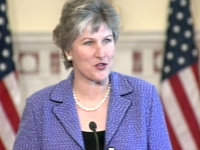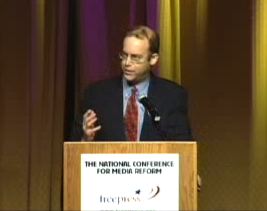Wanted: Activists to Help Get the Word Out about "The Best War Ever"
Submitted by Judith Siers-Poisson on


Submitted by Judith Siers-Poisson on

Submitted by Jonathan Rosenblum on
Willem Marx, a recent graduate from Oxford, dreamed of becoming a foreign correspondent. He applied for an internship in which he would "pitch story ideas" and "interact with the local media" in Iraq. That's how the U.S. government-funded Lincoln Group advertised it. Sent off to Baghdad with virtually no training, Marx was soon packing a loaded Glock and helping buy good press for America--$3 million in cash in his apartment safe and another $16 million coming for "news," PR and advertising.
It looks like it's close to endgame for earmark reform this Congressional session. Earmarks, the specific allocations of money to certain programs or organizations by Congress, has been a hot topic in Washington this year ever since the resignation of Rep.
Submitted by Diane Farsetta on
El Nuevo Herald, the Spanish-language newspaper owned by the Miami Herald's corporate parent, has been receiving negative attention lately. Two of its reporters and one freelancer were among 10 Miami journalists secretly paid by the U.S. government for appearances on the anti-Castro Radio Marti and TV Marti.
Submitted by Diane Farsetta on
A lawyer formerly with the U.S. Federal Communications Commission said agency officials ordered "every last piece" destroyed of a report linking greater concentration of media ownership to reduced news coverage.
Not content to wait patiently for the daily schedules of members of Congress to be released, the folks at the Sunlight Network have upped the ante on their Punch Clock Campaign.
 Karen Hughes, the U.S. Under Secretary of State for Public Diplomacy and Public Affairs, has been strangely silent this summer. The Bush confidante sworn in with much hoopla nearly a year ago to fix America's image overseas has had practically nothing to say recently about pressing issues of the day. Why? Was it a desire on her part to take a break from the demands of her job? Or did her lack of knowledge about the Middle East require her to be unheard if not unseen?
Karen Hughes, the U.S. Under Secretary of State for Public Diplomacy and Public Affairs, has been strangely silent this summer. The Bush confidante sworn in with much hoopla nearly a year ago to fix America's image overseas has had practically nothing to say recently about pressing issues of the day. Why? Was it a desire on her part to take a break from the demands of her job? Or did her lack of knowledge about the Middle East require her to be unheard if not unseen?
But now, upon the fifth anniversary of 9/11, Hurricane Karen, as she is known in Bush circles (or at least was until Katrina brought the President's poll numbers down), has chosen to let her views about the state of the world be better known, in a September 12 article in the national daily USA Today.
Unfortunately, Hughes's just published global tour d'horizon, reminiscent of a sanctimonious small-town sermon, reflects much that has been wrong with American public diplomacy with her at the helm. Her 928-word piece, "Where's the Outrage: A United World Must Resolutely Condemn Terror" shows Hughes — and her notions about America's place on our small planet — at their worst, for several reasons:
Our friends over at the Sunlight Network kicked off their Punch Clock Campaign today, which is offering a $1,000 "bounty" to any citizen who can get a member of Congress (or $250 for their challenger) to publicly post their daily schedule on the Internet. It's an intriguing new twist on the citizen muckraking model exemplified by the blogger campaign to reveal the senators that placed a secret hold on the earmark transparency bill.
They've already gotten one response, from Texan Alvis Yardley, who says that Rep. John Carter (R-Texas) is refusing to release his calendar due to "national security concerns"—despite the fact that the pledge only asks for the previous day's calendar. Guess we can't let the terrorists know where Carter was yesterday.
 "Media democracy" is a term that everyone defines a little differently.
"Media democracy" is a term that everyone defines a little differently.
Is it quality reporting that not only informs about local, national and international issues, but also facilitates citizen involvement? Is it having the diversity of our communities represented among media owners? Is it giving local programmers access to the airwaves? Is it holding broadcasters to the terms of their freely-granted licenses? Is it ensuring a variety of news and cultural media offerings?
Center for Media and Democracy (CMD)
520 University Ave, Ste 305 • Madison, WI 53703 • (608) 260-9713
CMD is a 501(c)(3) tax-exempt non-profit.
© 1993-2024